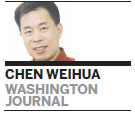 China is adopting a more welcoming attitude for the Trans-Pacific Partnership (TPP), a US-led free-trade agreement now being negotiated by 12 countries.
China is adopting a more welcoming attitude for the Trans-Pacific Partnership (TPP), a US-led free-trade agreement now being negotiated by 12 countries.
Zhang Jianping, director of the department of international economic cooperation at the Institute for International Economic Research of the National Development and Reform Commission, said China's attitude is clear.
"That is we are very happy to see those TPP members can make consensus, because we think TPP will be a possible approach for promoting Asia-Pacific economic integration," Zhang said at a seminar on Tuesday at the Center for Strategic and International Studies (CSIS) in Washington.
His words came at a time when the Obama administration is trying to pressure the House of Representatives to pass the fast-track Trade Promotion Authority (TPA) needed to negotiate TPP and other free-trade agreements.
The bill cleared the Senate on May 21, but in the House, Obama still is lobbying his own Democratic Party's Congress members.
The US and Japan are still haggling over the opening of the auto and agricultural markets under TPP, while Malaysia and Vietnam face some major hurdles in the negotiations.
Kathy Santillo, regional managing director of the US-ASEAN Business Council, said on Tuesday that there is no crystal ball as to whether the TPP can meet the deadline. The Obama administration hopes to make TPP his major presidential legacy.
While saying that TPP might be a possible approach to the Free Trade Area of the Asia Pacific (FTAAP), Zhang noted that countries such as China and Indonesia may not feel so comfortable with TPP.
TPP's high standards and strict regulations to some extent may surpass the development stage for some developing economies in the region, according to Zhang.
"That's why now we are making efforts to promote RCEP (Regional Comprehensive Economic Partnership)," he said, adding that developing economies may prefer the RCEP track.
Zhang believes the third possible track to FTAAP will be for TPP and RCEP to work together into a new template.
China actively promoted a roadmap for the FTAAP when it hosted the APEC summit last November.
Matthew Goodman, senior adviser for Asian economics at CSIS, said there are some narrow questions, such as how to get the Republic of Korea, the Philippines, Taiwan and others to express interest in TPP.
"The big question is how do we get China and Indonesia on board?" he said. "How do we move from that to an FTAAP?"
Admitting that China needs to reform and open up further to meet the TPP's high standards, Zhang said China is making a lot of efforts to promote and create a regional trade network.
China is now the world's largest exporter, the second-largest economy and a global manufacturing hub. Just in the past few months, China concluded free-trade agreements respectively with Australia and South Korea.
Zhang indicated that China also has been discussing free-trade agreements with countries such as Sri Lanka, Israel and those former Soviet republics, largely under China's Road and Belt Initiative, originally known as One Road and One Belt for economic integration.
He said China is facing a critical period of economic transition after the demographic dividends come to an end five or 10 years from now, adding that the new driving force will come through innovation, reform and opening up.
Zhang expressed that it is difficult for China to promote reform, especially for some government departments and local governments.
He praised some European nations for making a smart choice to join the Asia Infrastructure Investment Bank (AIIB). He said that given that China is a member of the World Bank and the Asian Development Bank, he hoped in the future that Japan and the US can be members of AIIB.
The US has widely been seen as trying to block the AIIB by lobbying its key allies not to join the China-initiated bank. But Kurt Tong, principal deputy assistant secretary of the Bureau of Economic and Business Affairs at the US State Department, disagreed on Tuesday.
"The United States is excited about this prospect," he said. "We are not angry; we are not mad, churlish or surly about it," he said in a keynote speech at the seminar.
But Tong said that the US is not a member, and "we don't need to be a member to welcome a new institution that is going to make contribution to the region".
Tong said it is a good thing that China is going to provide development capital to the Asia Pacific region.
"Do we care about how it is done, and the details that are going to be applied when China is an untested leader in providing development finance?" he said. "Yes, we care, and we will continue to care.
"Are we upset about this? Is this some kind of geopolitical game with the United States and China juggling things? No."